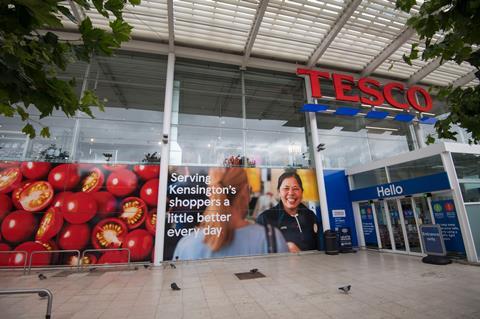UK food retailer Tesco has launched an extension to its environmental baselining programme and called on Government for a national farm data framework to support food security.

Tesco has announced a “significant extension” to its environmental data baselining programme, which it says will take support for the programme to more than £1.5 million, with a new Sustainable Farming Programme to help British lamb and beef farmers capture data at scale. The supermarket chain is also calling for the introduction of a national data baselining framework to “end the patchwork approach to data collection, and safeguard the country’s food security”.
Nine in 10 farmers want Government to do more
Tesco UK CEO Ashwin Prasad will make the call to action at an event for British farmers and food suppliers at Tesco’s headquarters. The announcement follows research by Tesco canvassing the views of hundreds of UK farmers, which it said found 91% want Government to do more to support farming resilience.
According to Tesco, the research found the majority of farmers (68%) want to do more to make their farms more environmentally friendly, but 96% of farmers said that inconsistent environmental standards and data reporting were key barriers to progress. A further 73% reported difficulties getting innovation onto farms that will improve efficiency, resilience and sustainability. Soil health was named by 64% of farmers as a particular area of concern.
Tesco stated that the new data baselining programme (referred to as Tesco Sustainable Farming Programme) aims to address these concerns. Delivered in partnership with Soil Association Exchange (SAX), it will support 360 beef and lamb farmers from Tesco’s Sustainable Farming Groups to capture soil, water and nature data at “unprecedented” scale.
The programme will establish clear baseline measurements over its initial 12 months, providing farmers with tailored advice to strengthen farm resilience and efficiency.
“British farmers are the backbone of our food system but they face unprecedented pressure, from rising costs and climate shocks to uncertainty over Government policy.”
Ashwin Prasad, Tesco UK
Tesco UK CEO Ashwin Prasad stated: “British farmers are the backbone of our food system but they face unprecedented pressure, from rising costs and climate shocks to uncertainty over Government policy. They tell us data is vital to measuring and driving improvements in sustainability and efficiency on farms, but the patchwork approach to data across the UK has resulted in a lack of a unified or standardised framework to track industry-wide progress or share insight and best practice.
“Our new programme will give farmers the data and tools to build resilience and it’s vital farmers are provided with a clear and consistent reporting framework to reduce the burden they face and make it easier for the whole industry to measure and scale progress. This is fundamental to creating a stronger future for UK agriculture and protecting the country’s ability to reliably grown high-quality, homegrown food, now and for the future.”
Unlocking sustainable practices
Former National Farmers’ Union president Baroness Minette Batters said: “Farmers are working hard to feed the nation sustainably, but they cannot do it alone. Establishing and supporting a consistent national baselining framework is essential if we are to measure progress fairly, unlock new opportunities, and build resilience across the sector. The whole industry must work together to support farmers in this transition and ensure UK agriculture can thrive in the years ahead.”
The new initiative builds on recommendations set out in Tesco’s Greenprint for UK Farming Report, unveiled earlier this year at the Oxford Farming Conference, which called for standardised data and insights to help farmers futureproof their businesses and reduce their environmental impact.
CEO of the Soil Association Exchange Joseph Gridley commented: “This partnership is an exciting opportunity to show how consistent data, expert advice and targeted funding can drive real change on UK farms.
“At a time of unprecedented challenges, it points to a future where farmers have the clarity and support they need to take action with confidence. Farmers are already doing incredible work to be more sustainable – but they need a joined-up supply chain behind them. Only then can we unlock the full power of data and independent advice to help farms become more resilient, sustainable and profitable.”















